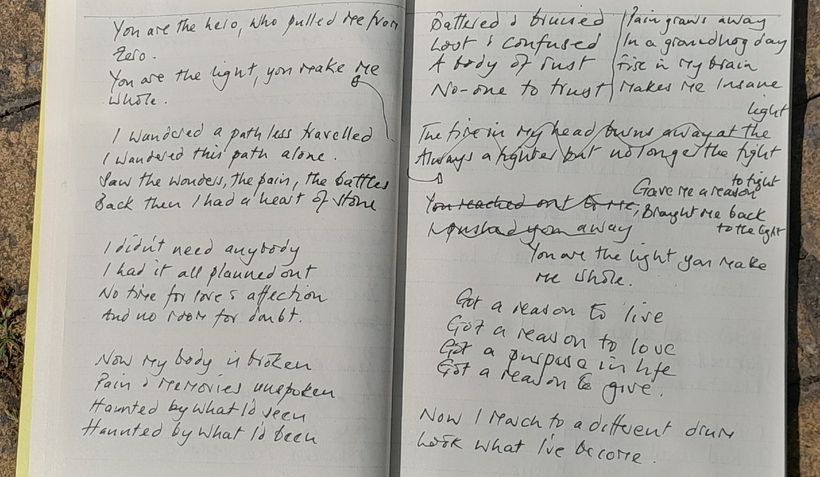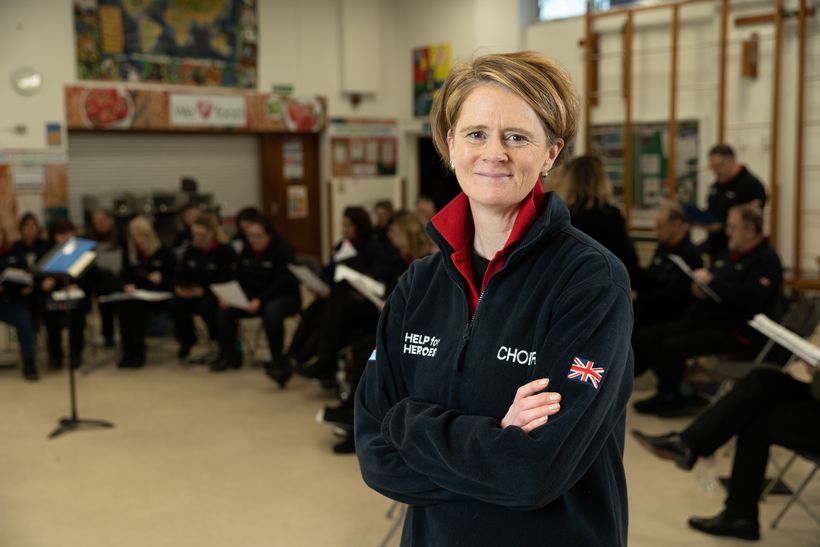Updated on
A Kent veteran we supported after medical discharge has demonstrated her songwriting skills at a workshop run by a co-founder of the chart-topping band Squeeze.
Chris Farrell, 63, who rose to the rank of Warrant Officer Class One in the Royal Military Police Special Investigation Branch (SIB), attended the Buddy Holly Educational Foundation-sponsored Chris Difford Songwriting Retreat, and was filmed for a documentary to be pitched to the BBC.
It was the second time Chris had attended the workshop organised and promoted by Difford and BBC Radio 2 DJ ‘Whispering Bob’ Harris. During her first visit, in 2019, she was mentored by two-time Grammy Award nominee Beth Nielsen Chapman, a US singer-songwriter and member of the Nashville Songwriters Hall of Fame.
The 64-year-old Texan has written for many big-name artists, including Willie Nelson, Tanya Tucker, Mary Chapin Carpenter, Alabama, Crystal Gayle, and Bette Midler. And she has recorded with the likes of Amy Grant, Michael McDonald, Emmylou Harris, Paul Carrack, and the winner of the 65th Annual Grammy Awards ‘Song of the Year’, in February 2023, Bonnie Raitt.
Chris’ road to songwriting began after she joined the Help for Heroes choir.
She explained: “Help for Heroes was hosting a creative arts exhibition in London a few years ago, and the choir was involved on opening night.
A CATHARTIC EXPERIENCE
“I thought I’d sit down and write a poem for inclusion in the exhibition – but I couldn’t. I felt too inhibited. I felt if I had a structure to it – if every syllable has to be there because it needs to be there – I should be able to do it. That worked well for me.
“I was so shocked with what I wrote. It was certainly cathartic. The poem just got longer and longer, and more and more complicated. A year or so later, Choir Lead Caroline Rawlins asked me if I wanted to be one of three veterans to go on a two-day song-writing course. Initially, I thought it would be a load of sad people, sitting round – maybe somebody with a guitar – coming up with a collaborative song or something.
“There was a list of names on the door; I was looking down them and I noticed ‘Beth Nielsen Chapman’ and I said ‘Wow! I’ve got a couple of her CDs’. Bob Harris’ wife Trudie, an amazing lady, overheard that and said, ‘Right you’re working with Beth today’. I thought ‘just try to be cool’,” she laughed.
“When we were introduced, I told her how much I loved the song she wrote about Martin Luther King and she said, ‘I know the one you mean, Stones In The Road ... but I didn’t write that’,” laughed Chris, again.
She showed Beth the poem she’d written, and they worked on it together “putting in a bridge and a chorus”, before the award-winning singer performed the song to the rest of the group in the evening to a very warm reception. Struggling to get to sleep that night, Chris decided to write more lyrics.
She said: “I started writing about a veteran who was on the streets – sleeping outside a shop, being kicked and urinated on – completely let down by the system after being promised he’d be looked after.”
The choir has been really important to me. I absolutely loved it, immediately, just being back in that military community ...
Veteran
BOTTLE TOPS FOR MEDALS
The following day she was paired with Robert Vincent, a Liverpudlian singer/songwriter, and they used the lyrics as the basis for a song called Bottle Tops for Medals.
“It was a fantastic song. He performed it, movingly, that evening to rapturous applause; he’s an excellent guitarist and a fantastic singer,” she said.
She continued to perform with the Charity’s choir and, this year, the opportunity arose for her to return to the course and she “jumped at the chance”.
Having been medically discharged in 1999, after contracting Japanese encephalitis in Hong Kong, Chris spent five months in hospital and three years at a rehabilitation centre having suffered brain damage, chronic fatigue syndrome, speech issues, severe tinnitus and derealisation disorder– where one feels the world around oneself is unreal – related to either PTSD or brain damage. Additionally, she also suffers neck and back problems from an incident in Northern Ireland.
She was receiving counselling from Combat Stress when her fellow veterans suggested she contact Help for Heroes.
She remembered: “At a Combat Stress meeting a lot of the guys there, younger than me, were talking about Help for Heroes – and I thought, then, the Charity only dealt with those who’d fought in Afghan or Iraq, but they told me it’s for any veteran who needs help.”
HITTING THE RIGHT NOTES
As part of her recovery journey, Chris joined our choir, which has proved enormously beneficial to her and helped turn her around from her darkest period.
Chris explained: “I was struggling with my mental health. The anti-social behaviour of neighbours was stressing me out. It was preventing me from getting the rest I needed, the tinnitus became physically painful, and I felt totally trapped within my derealisation with no escape. I asked the police and local council to intervene, but they were totally unhelpful. I was suicidal and took steps to end my life.
“I realised I had to get myself sorted out. But I still felt I was a WO1 in SIB, so you don’t ask for help. You believe that’s a weakness. But it really isn’t, it’s a strength.
“The choir has been really important to me. I absolutely loved it, immediately, just being back in that military community. In that environment you're accepted for who you are; everybody has their own individual issues – physically, psychologically, or both – but it’s not at all judgmental.
“Writing the poem right at the beginning of my experience, in 2019, explaining how it felt to be me, opened up a different part of my brain. Not just creatively, but in giving me more confidence and self-esteem; I’m not that sad, lonely, old woman who the locals probably think is a bit strange,” she smiled.
Caroline Rawlins has seen for herself the changes in Chris’ personality and demeanour – having witnessed similar transformations in many of her choir members.
She said: “It is hugely fulfilling to be able to support this sort of evolution in Chris and others’ lives. The choir is a hugely supportive, safe space where members can benefit not just from the endorphins created by singing, but the great peer support and camaraderie the choir generates. We are always open to more singers who would benefit – so we’d love to hear from veterans who’d like to be involved.”




